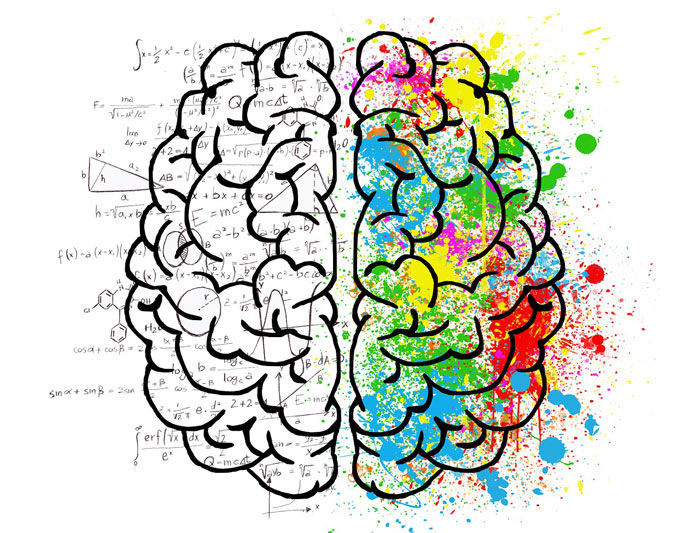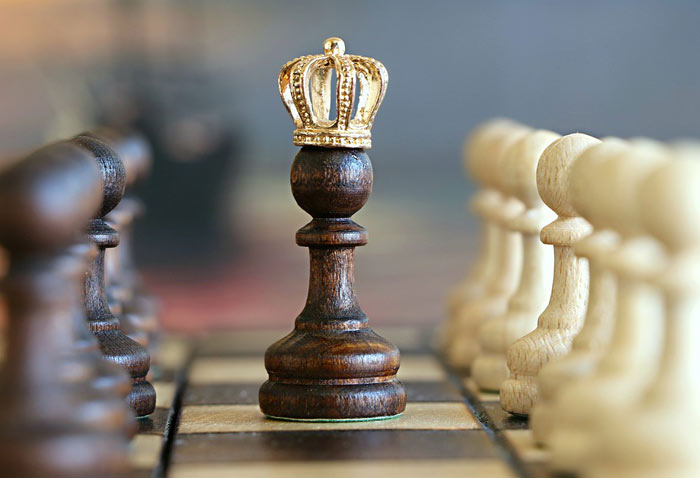A brain is a veritable CPU (Central Processing Unit); it is responsible for every thought and action in our bodies, and it is the nerve centre of our very core. Neuroscientists and medical experts have long been fascinated by the human brain. It is capable of supreme intelligence, ranging from literary prowess, sporting brilliance, to scientific discovery.

As the epicentre of our being, the brain deserves recognition for the amazing job it does every second of every day throughout our lives. Through the brain’s interactions with the nervous system, the musculoskeletal system, and every organ we can act, react, question and resolve a myriad of complex issues. If nothing else, we should pay homage to our brain by feeding it a healthy diet of mental, physical, and metaphysical sustenance.
Many people have heard the line, ‘We only use 10% of our brain’s capacity’ but is this true? According to Medical News Today a survey conducted in 2013 indicated that 65% of Americans believe that we only use 10% of our brains. However, this is nothing more than gobbledygook. According to a prominent neurologist, Barry Gordon, most of the brain is always active. This is easily seen with functional magnetic resonance imaging, and the brain remains active even while we’re sleeping.
While the actual percentages of brain utilization change during the day, and from person-to-person, our brains are always alert and awake. Unfortunately, it’s the myth that remains and the reality that gets relegated. Everyone recognizes that there are times when our brains aren’t firing as they should, and this is when you need to use time-tested tips, tricks, and strategies to improve your brainpower.
#1 Eating Balanced Meals Helps
Nutrition, nutrition, nutrition. That’s the name of the game. You are what you eat. Eat to live, don’t live to eat. We’ve heard it all before. It’s true! It is a well-known fact that healthy eating and healthy living go hand-in-hand. When you eat well you decrease the likelihood that your body will not be receiving all of the nutrients, vitamins, minerals, electrolytes and hydration that it needs. There are several plus points to healthy eating, notably elimination of type II diabetes, obesity, and cardiovascular disease. There are certain foods that bode well for improved brain function, notably pecans and walnuts which are rich in antioxidants, oily fish such as tuna, salmon, mackerel and omega-3 fatty acids, fruits and vegetables such as sweet potatoes, red peppers, blueberries, broccoli, spinach and carrots.
#2 Exercise Your Body to Sharpen Your Mind
Regular exercise has been linked to decreased risk of dementia and health problems, particularly cardiovascular disease. It is also an important bulwark against loss of cognitive function by keeping the body busy, and the mind in shape. When the blood is flowing, and adrenaline is being released, multiple other chemical reactions are taking place at the same time. These exercise options such as cycling, power walking, swimming, or yoga have calming, healing, and nourishing effects on the body and the mind.
#3 Plan Ahead in Your Mind
 Otherwise known as mind mapping, planning is one of the most effective ways to stimulate your grey matter. When you think ahead, your mind conjures up a multitude of scenarios, problems, and solutions to help you achieve your objectives. When you make mental notes, your neurons start firing, reducing the likelihood of decreased brain function, cognitive decline, and depression. Plans keep us focused on the present and the future – eliminating the dreaded stalemate that the monotony of daily life causes. Mind mapping is an attempt to generate a visual representation of what you want, and how you perceive everything around you.
Otherwise known as mind mapping, planning is one of the most effective ways to stimulate your grey matter. When you think ahead, your mind conjures up a multitude of scenarios, problems, and solutions to help you achieve your objectives. When you make mental notes, your neurons start firing, reducing the likelihood of decreased brain function, cognitive decline, and depression. Plans keep us focused on the present and the future – eliminating the dreaded stalemate that the monotony of daily life causes. Mind mapping is an attempt to generate a visual representation of what you want, and how you perceive everything around you.
#4 Play Music to Stimulate Your Brain
In the 1980s and 1990s, the Rocky saga exploded onto the screen. It continued well into the 2000’s, and the Rocky montage is imprinted on our consciousness. The music that accompanies Rocky’s training regimen is an example of how we can use a symphony of sounds to stimulate brain activity, allowing us to focus on the tasks at hand. In much the same way, we can use music to calm our senses just before bedtime with the sounds of running water in a stream, perhaps even birds chirping in the meadows. It has been said that classical music is best for studying purposes, while rock and pop are great for revving your engines. There is no doubt that music releases dopamine in our systems that can help with mental acuity and focus. Cognitive performance can certainly be improved with music and melodies.
#5 Chewing Gum to Boost Your Brain
We hardly ever get to extol the virtues of chewing gum. It is a sticky, elastic substance that loses its flavour within minutes, and then causes our jaws to ache before we dispose of it. We’ve even been told that chewing gum causes our stomach acids to start going into overdrive as our digestive system prepares for food breakdown. This causes excess acid, and bloat in our systems. How can chewing gum be good for the brain? Studies suggest that chewing gum can enhance your mental sharpness for a period of 20 minutes. Why? For the same reasons that our stomachs start secreting enzymes in anticipation of digestion, our brains benefit from the increased blood flow that also brings much-needed oxygen to our cerebral matter.
#6 Practice Meditation and Relaxation
 What’s so great about meditation and relaxation? For starters, they release tension. Tension leads to high blood pressure, strokes, seizures, heart attacks, breakdowns, and everything else that is ungodly and unhealthy. By eliminating the source of stress through meditation and relaxation techniques, you can reduce the likelihood that you to will fall victim to these horrible ailments. When you meditate, you focus on good things. That positive energy allows you to recalibrate, defragment, and rewire your cognitive processing functions and emotional wellness. The goal is peace of mind, body, and soul. A relaxed mind is capable of amazing feats such as greater retention, quicker processing speeds, better decision-making processes, and enhanced health and wellness.
What’s so great about meditation and relaxation? For starters, they release tension. Tension leads to high blood pressure, strokes, seizures, heart attacks, breakdowns, and everything else that is ungodly and unhealthy. By eliminating the source of stress through meditation and relaxation techniques, you can reduce the likelihood that you to will fall victim to these horrible ailments. When you meditate, you focus on good things. That positive energy allows you to recalibrate, defragment, and rewire your cognitive processing functions and emotional wellness. The goal is peace of mind, body, and soul. A relaxed mind is capable of amazing feats such as greater retention, quicker processing speeds, better decision-making processes, and enhanced health and wellness.
#7 Get the Right Amount of Sleep
It’s lucky #7 on the list, and an important one at that. Sleep = Rest. Our brains need time to process the day’s events and what better way than to shut down for the night. Truth be told, it’s not always 8 hours + of sleep that is needed to recharge and regenerate; sometimes all that’s needed is a power nap for 10 to 20 minutes in between strenuous mental exercises to have you roaring back with all the intensity, and problem-solving ability that you need. Our bodies cannot go on indefinitely without sleep – it is a human impossibility. However, the sheer exhaustion we may feel from day-to-day certainly robs us of efficient brain function. A simple elixir is to close your eyes and count sheep a.k.a. go to sleep.
#8 Make Notes of What’s Important
Nowadays, most everyone uses Google Calendar, smartphone notes, or online media to schedule activities, post information, or serve as reminders for shopping lists etc. However, it’s always a good idea to keep a diary, or at least a stash of Post-It notes to write down things that are important. The act of transcribing thought to paper is deeply entrenched in our psyche, and actually helps with recall. When you write things down, you are thinking about how best to string ideas together in a coherent and logical fashion. Next time you’re about to make note of something, put pen to paper and let it flow.
#9 Play Games That Use Your Mind
 This is different to playing mind games. Games that require mental sharpness pepper the scene. One could instantly count at least five games that require skill, strategy, and decision-making prowess. Think of chess, wargames, blackjack, bridge, poker, Scrabble, Clue, Trivial Pursuit backgammon. Each of these games is associated with using your grey matter to get the best of your opposition. Scheming, planning, and beating your opponents is the name of the game with poker.
This is different to playing mind games. Games that require mental sharpness pepper the scene. One could instantly count at least five games that require skill, strategy, and decision-making prowess. Think of chess, wargames, blackjack, bridge, poker, Scrabble, Clue, Trivial Pursuit backgammon. Each of these games is associated with using your grey matter to get the best of your opposition. Scheming, planning, and beating your opponents is the name of the game with poker.
One way to fine-tune your skills as a card player is to practice free blackjack online. That way you can get a good handle on things by understanding probability analysis, card counting techniques, sound bankroll management and more. Seniors derive many benefits from card games especially. A growing body of research indicates that it is possible to delay the onset of cognitive diseases such as Alzheimer’s by keeping your mind as active as possible. In this vein, card counting, card analysis, and bankroll management can certainly help.
#10 Try Something Entirely New
If you do the same thing the same way every day, you are assured of the same outcome. Good or bad, this isn’t the best thing for your brain. It’s important to keep exploring, and challenging yourself: Learn about who you are and the world around you. Start to question the services, products, and things around you. Try to take an active interest in what others find important, to stimulate your own sense of well-being.
If you are the type of person who is pessimistic, start becoming proactive and adopt a can-do attitude. If you read comics, put them away and read books. If you use GPS, stop and try and read a map. If you use calculators to perform routine functions, stop and try and figure it out in your head. There are so many new ways that you can change your routine, your reality. You simply must try something entirely new!










